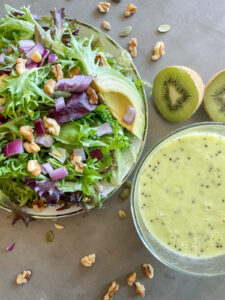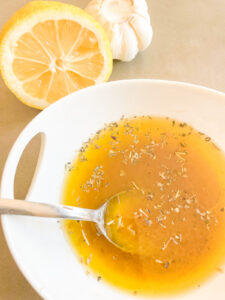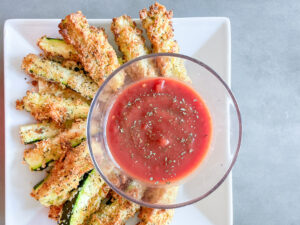Best Low Carb Vegan Burger | Black Bean Burger Recipe
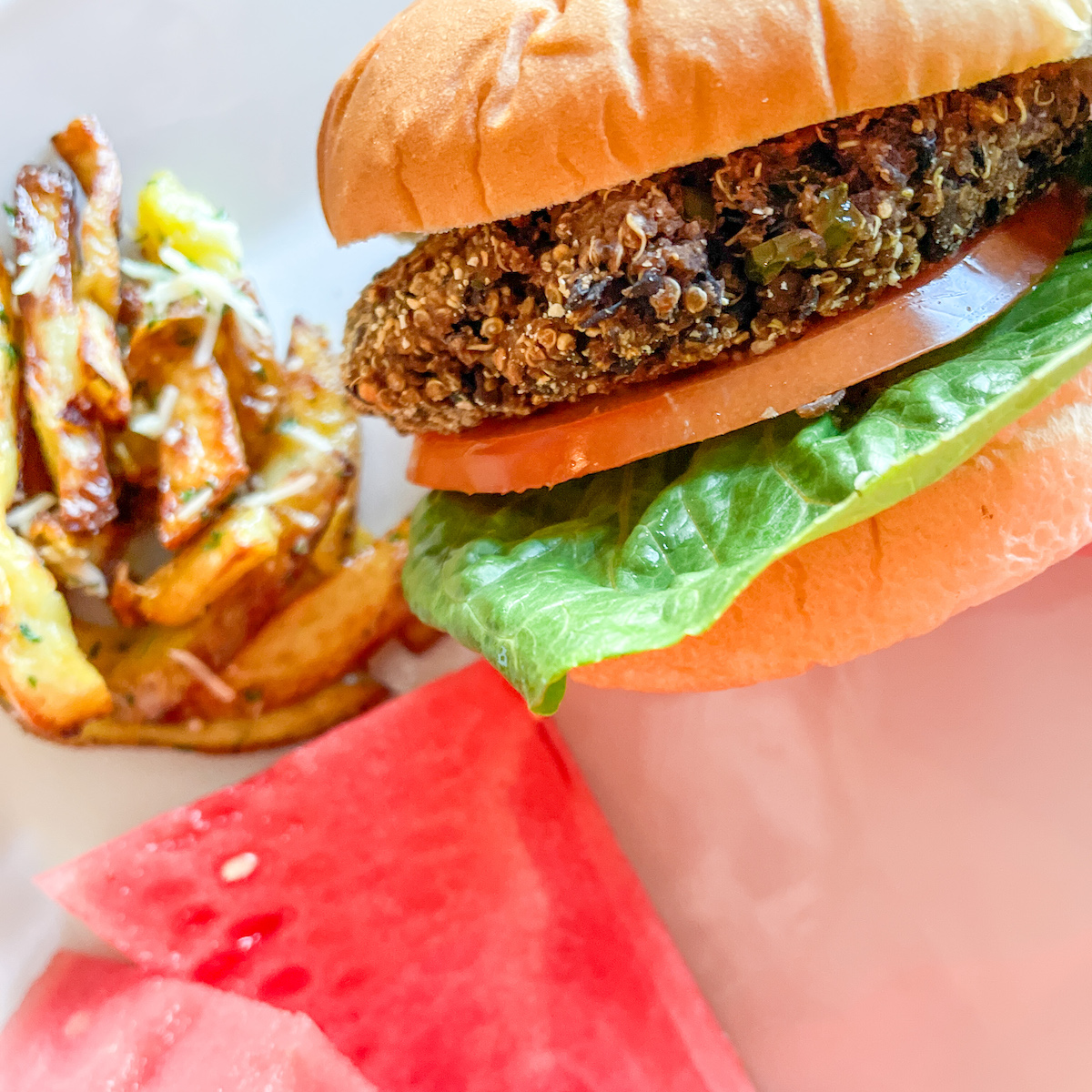
Packed with wholesome ingredients like black beans, quinoa, and fresh vegetables, these low carb vegan burgers not only taste fantastic but also offer a wealth of health benefits. Whether you're following a vegan lifestyle, watching your carb intake, or simply looking to incorporate more plant-based meals into your diet, this recipe is sure to impress. With its hearty texture, robust flavors, and simple preparation, these burgers are a crowd-pleaser that's perfect for any occasion.
Jump to RecipeJump to:
- Low Carb Vegan Burger Recipe Ingredients (health benefits and possible substitutions)
- Low Carb Vegan Burger Recipe Steps
- Serving Suggestions for this Black Bean Burger
Why You Should Try This Low Carb Vegan Burger
This is the best vegan burger recipe you will ever try because:
- it is full of healthy plant-based protein sources.
- it is versatile (you can add or substitute vegetables and seasonings to suit your taste).
- it is a great option for meal prep.
- it is easily made with pantry staples that you likely have around the kitchen.
- it is flavorful and delicious!
- it is perfect for grilling season!
The Fresh Ingredients in this Low Carb Vegan Burger Provide Many Healthy Benefits
Let's explore the health benefits of the ingredients in this low-carb vegan burger recipe, along with some possible substitutions:
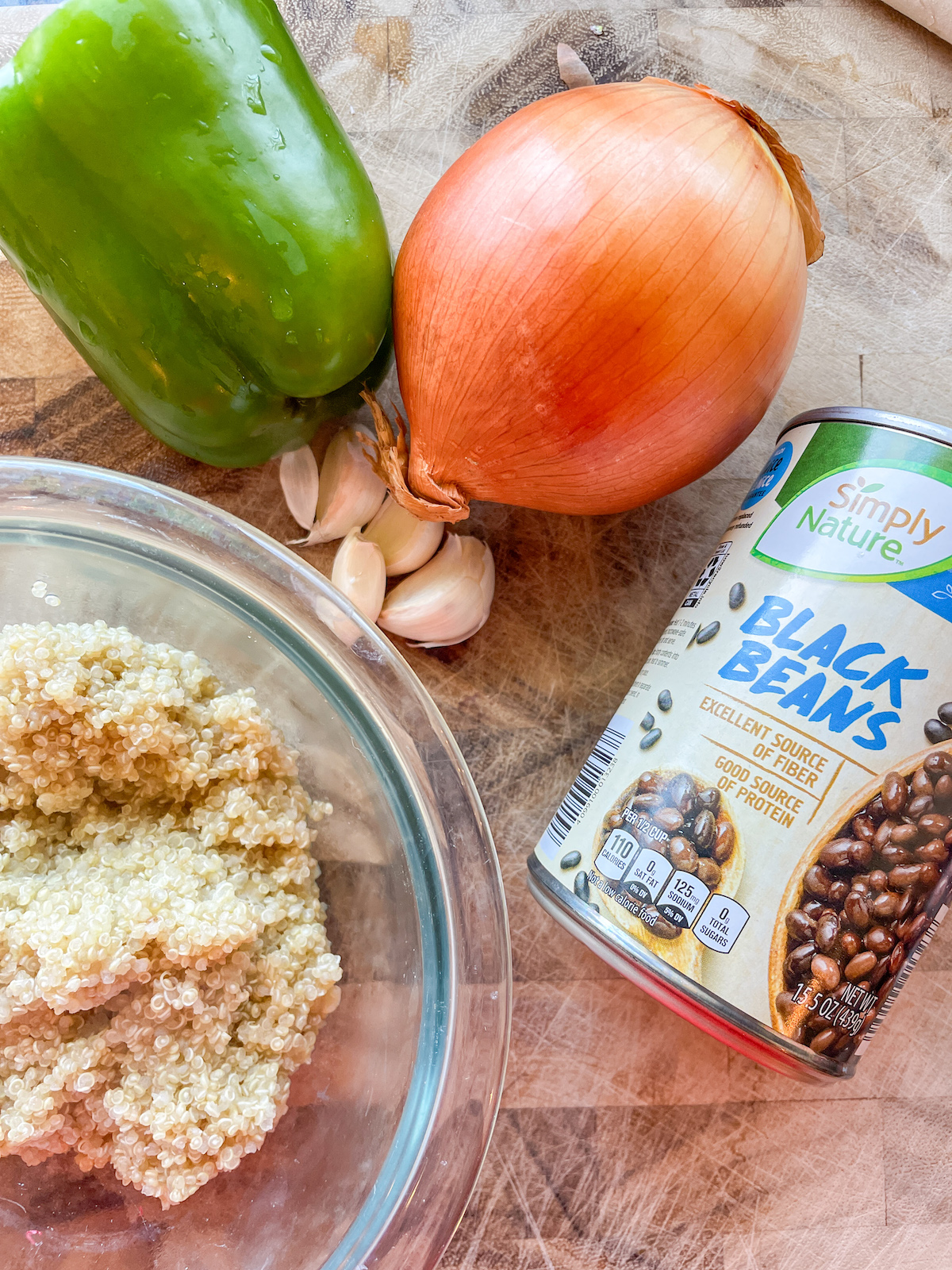
Black Beans
- Health Benefits: Black beans are an excellent source of plant-based protein, fiber, and various vitamins and minerals, including folate, iron, and magnesium. They can help support digestive health, regulate blood sugar levels, and promote heart health.
- Black beans are often considered a good low-carb option for several reasons:
- High Fiber Content: Despite being relatively high in carbohydrates, black beans are also rich in dietary fiber. Fiber is indigestible by the body and does not contribute to the net carb count. Instead, it helps slow down the absorption of glucose into the bloodstream, which can help stabilize blood sugar levels and prevent spikes and crashes in energy.
- Low Glycemic Index (GI): Black beans have a low glycemic index, which means they have a minimal impact on blood sugar levels when consumed. Foods with a low GI are digested and absorbed more slowly, leading to a gradual rise in blood sugar levels and providing sustained energy over time.
- Complex Carbohydrates: The carbohydrates found in black beans are primarily complex carbohydrates, which take longer to break down compared to simple carbohydrates. This slow digestion process contributes to feelings of fullness and satiety, helping to control appetite and prevent overeating.
- Rich in Protein: Black beans are also a good source of plant-based protein, which is essential for muscle repair, growth, and overall health. Protein can help keep you feeling full and satisfied, reducing the likelihood of snacking on high-carb foods between meals.
- Nutrient Density: In addition to being low in carbs, black beans are packed with essential nutrients such as folate, iron, magnesium, and potassium. These nutrients play vital roles in various bodily functions, including energy production, blood cell formation, and muscle function.
Quinoa
- Health Benefits: Quinoa is a gluten-free whole grain that's high in protein, fiber, and essential nutrients like iron, magnesium, and manganese. It's considered a complete protein, containing all nine essential amino acids, making it an excellent plant-based protein source.
- Substitutions: If you prefer, you can substitute quinoa with other whole grains such as brown rice, bulgur wheat, or farro. These grains will offer similar nutritional benefits and contribute to the texture and binding ability of the burger patty. Bread crumbs could also be used.
- Quinoa is often considered a good low carb diet option for several reasons:
- Lower in Net Carbs: While quinoa is technically a seed, it is often prepared and consumed as a grain, making it a popular alternative to traditional grains like rice or wheat. Compared to these grains, quinoa is lower in net carbs, which refers to the total carbohydrates minus the fiber content. This is because quinoa is relatively high in fiber, which slows down the absorption of carbohydrates into the bloodstream and helps stabilize blood sugar levels.
- High in Protein: Quinoa is one of the few plant-based foods that contain all nine essential amino acids, making it a complete protein source. Protein is essential for muscle repair, growth, and overall health, and incorporating quinoa into a low-carb diet can help meet protein needs without relying on higher-carb sources like grains or legumes.
- Rich in Fiber: Quinoa is a good source of dietary fiber, which is beneficial for digestive health, satiety, and weight management. Fiber helps promote feelings of fullness and can aid in regulating bowel movements. By slowing down the digestion and absorption of carbohydrates, fiber can also help prevent blood sugar spikes and crashes.
- Nutrient Density: In addition to being low in net carbs, quinoa is packed with essential nutrients such as vitamins, minerals, and antioxidants. It contains significant amounts of iron, magnesium, phosphorus, manganese, and folate, among others. These nutrients play vital roles in various bodily functions, including energy production, bone health, and immune function.
- Versatility: Quinoa is incredibly versatile and can be used in a wide range of dishes, from salads and soups to stir-fries and pilafs. Its neutral flavor and fluffy texture make it a suitable substitute for higher-carb grains like rice or pasta in many recipes, allowing for greater flexibility in meal planning and preparation.
Other Ingredients in these vegan burgers:
Bell Pepper, Onion, and Garlic
- Health Benefits: Bell peppers, onions, and garlic are rich in antioxidants, vitamins, and minerals that support overall health and well-being. They provide immune-boosting vitamin C, anti-inflammatory compounds, and digestive-promoting properties.
- Substitutions: Feel free to use any variety of bell pepper (such as red, yellow, or orange) and onion (such as white, yellow, or red) based on your preference or what you have on hand. If you're sensitive to garlic, you can omit it or use garlic powder instead.
Olive Oil
- Health Benefits: Olive oil is a staple of the Mediterranean diet and is rich in heart-healthy monounsaturated fats and antioxidants. It may help lower inflammation, reduce the risk of heart disease, and improve cholesterol levels.
- Substitutions: You can substitute olive oil with other healthy oils such as avocado oil, coconut oil, or grapeseed oil. Each oil will provide a slightly different flavor profile but will still contribute to the burger's moisture and texture.
Spices (Cumin, Paprika, Chili Powder, Salt, Black Pepper)
- Health Benefits: The spices used in this recipe, including cumin, paprika, chili powder, salt, and black pepper, not only add flavor but also offer various health benefits. They contain antioxidants, anti-inflammatory compounds, and digestive-supporting properties.
- Substitutions: Feel free to adjust the spices to suit your taste preferences or dietary restrictions. You can use different combinations of spices or add additional herbs and seasonings such as oregano, thyme, onion powder, or rosemary for extra flavor.
How to Make this Low Carb Vegan Burgers
Let's break down the steps for making this Low Carb Vegan Burger Recipe:
- Prepare the Veggies:
- Finely chop ½ bell pepper, ½ onion, and 4 cloves of garlic. A food processor may be used for this step if desired.
- Sauté the Veggies:
- Heat a drizzle of olive oil in a skillet over medium heat.
- Add the chopped veggies to the skillet and cook for about 3 minutes, or until they begin to soften.
- Add Spices:
- Sprinkle 1 tablespoon of cumin, 1 teaspoon of paprika, 1 teaspoon of chili powder, ½ teaspoon of salt, and black pepper over the cooked veggies.
- Stir well to coat the veggies in the spices and cook for another minute to toast the spices slightly.
- Remove the skillet from heat and set aside.
- Prepare the Black Beans:
- Drain and rinse 1 can of black beans.
- Pat the black beans dry with a dish towel or paper towel to remove excess moisture.
- Mash the Black Beans:
- Transfer the black beans to a large bowl.
- Mash the black beans with a fork until they form a chunky paste.
- Combine Ingredients:
- Add the cooked quinoa and the veggie/spice mixture to the mashed black beans.
- Mix everything together until well incorporated.
- Form in Individual Patties:
- Divide the mixture into six equal portions.
- Shape each portion into a patty and place the uncooked burger patties on a foil-lined (or parchment paper lined) baking sheet.
- Bake the Patties:
- Preheat the oven to 375°F (190°C).
- Bake the patties for about 20 minutes, then carefully flip them using a spatula.
- Bake for another 20 minutes, or until the patties are firm and slightly crisp on the outside.
- Rest and Serve:
- Allow the patties to rest for a few minutes before transferring them to a bun or serving them on a plate.
- These patties are on the crumbly side, so handle them with care.
- Enjoy:
- Serve the low-carb vegan bean burgers on your favorite bun or lettuce wrap, and add your favorite toppings such as lettuce, tomato, avocado, or vegan cheese.
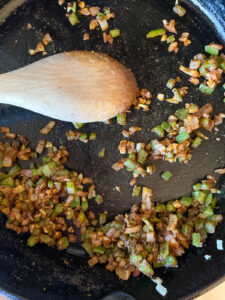
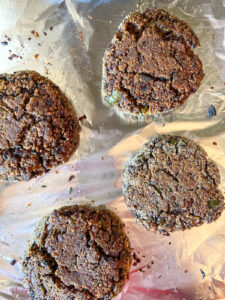
Serving Suggestions for these Homemade Veggie Burgers
Here are three serving suggestions for the low-carb vegan burger recipe:
- Classic Burger Style:
- Serve the low carb veggie burger on a low-carb keto burger buns or lettuce wrap.
- Top the burgers with your favorite toppings such as lettuce, tomato, onion, avocado, pickles, and vegan cheese slices.
- Add condiments like mustard, ketchup, vegan mayonnaise, or hot sauce for extra flavor.
- Pair the burgers with a side of homemade fries or a simple mixed green salad or healthy kale salad for a complete meal.
- Greek-Inspired Burger Bowl:
- Skip the bun and serve the vegan veggie burgers on a bed of mixed greens or spinach.
- Top the burgers with sliced cucumber, cherry tomatoes, red onion, Kalamata olives, and crumbled vegan feta cheese.
- Drizzle the bowl with a homemade Greek vinaigrette.
- Garnish with fresh chopped parsley or dill for a burst of flavor.
- Lettuce Wrap Burger (bunless burger recipe)
- Instead of using a bun, wrap the veggie patties in large leaves of butter lettuce or romaine lettuce.
- Fill the lettuce wraps with the burger patties, sliced avocado, roasted red peppers, and caramelized onions.
- Drizzle with a tangy tahini sauce made with tahini paste, lemon juice, garlic, salt, and water.
- Serve with a side of cucumber and tomato salad tossed in a light vinaigrette dressing.
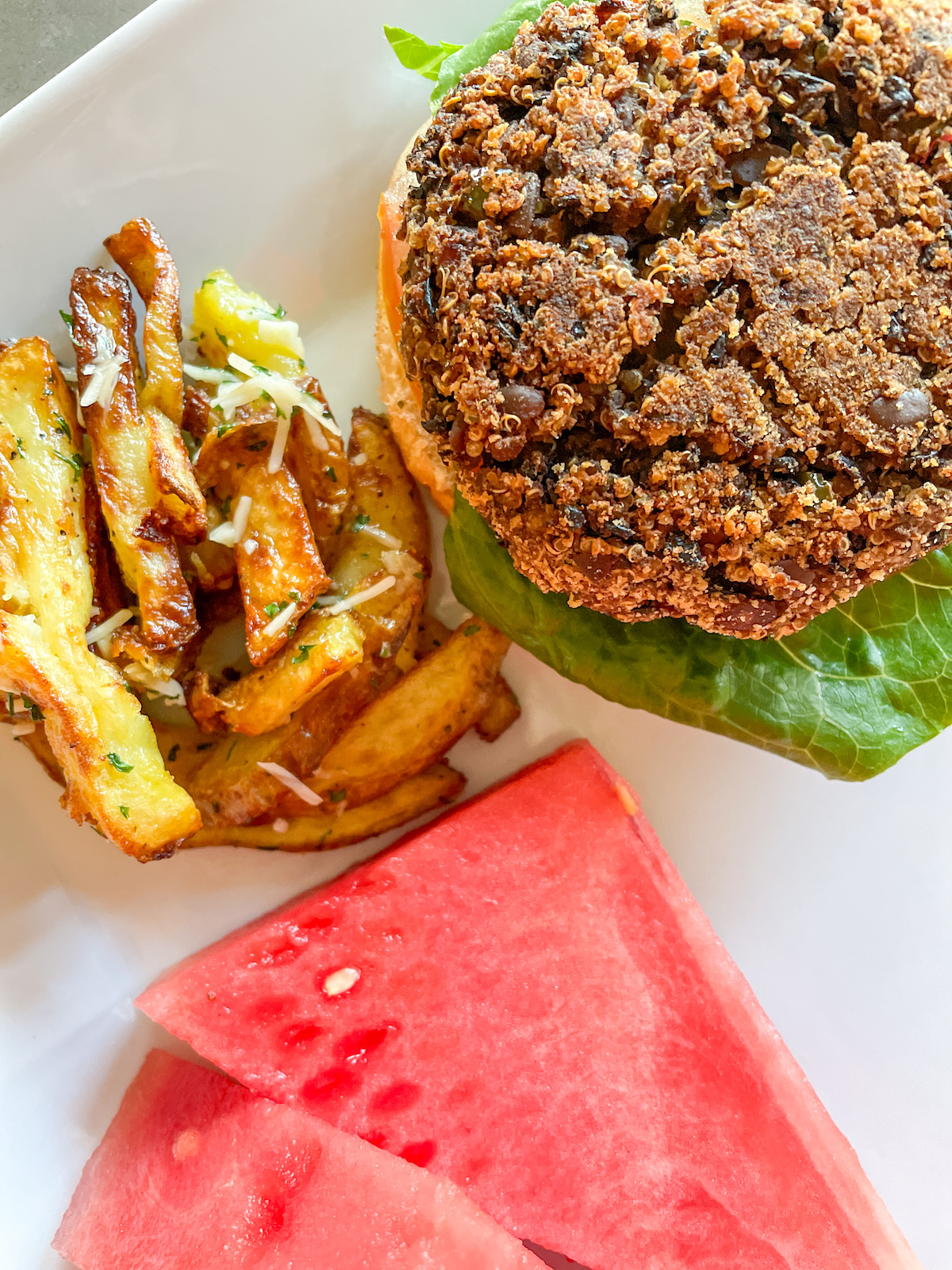
Frequently Asked Questions about this Low Carb Vegan Burger Recipe
Can I freeze the burger patties for later use?
Yes, you can freeze the burger patties for future meals. They are on the crumbly side, so be careful when handling them. After baking the patties according to the recipe instructions, allow them to cool completely. Once cooled, place the patties in a single layer on a baking sheet lined with parchment paper and transfer them to the freezer. Once frozen solid, transfer the patties to an airtight container or freezer bag, placing parchment paper between each patty to prevent sticking. Store in the freezer for up to three months. When ready to enjoy, thaw the patties in the refrigerator overnight, then reheat them in a skillet or oven until warmed through.
Can I make this recipe ahead of time for meal prep?
Absolutely! This recipe is perfect for meal prep. You can prepare the burger patties in advance and store them in the refrigerator for up to 3-4 days before baking. Simply follow the recipe instructions to form the patties and place them on a foil-lined baking sheet. Cover the baking sheet with plastic wrap or aluminum foil and refrigerate until ready to bake. When you're ready to enjoy, bake the patties according to the recipe instructions and serve them fresh or store leftovers in the refrigerator for future meals.
Can I substitute the quinoa with another ingredient?
Yes, if you prefer to omit quinoa or need a substitution due to dietary restrictions, you can replace it with cooked brown rice, cauliflower rice, or grated zucchini. Each substitution will offer a slightly different texture and flavor profile but will still contribute to the overall structure of the burger patties. Be sure to adjust the cooking time and moisture content accordingly based on the substitution used.
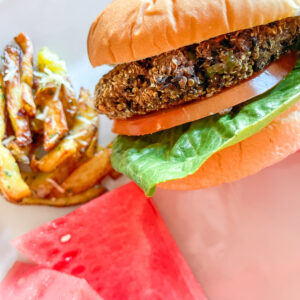
Low Carb Vegan Burger
Ingredients
- ½ bell pepper
- ½ onion
- 4 cloves garlic
- 1 can black beans
- 1 cup cooked quinoa
- Olive oil
- 1 T cumin
- 1 t paprika
- 1 t chili powder
- ½ t salt
- black pepper
Instructions
- Finely chop veggies and cook in olive oil for 3 min or so.
- Add spices to cooked veggies. Cook for 1 min to toast them a bit.
- Drain and rinse the black beans. Remove excess water with a dish towel or paper towel.
- In a large bowl, mash black beans with a fork.
- To the mashed black beans, mix in cooked quinoa and veggie/spice mixture. Make sure everything is well incorporated together.
- Create six patties and place them on a foil-lined baking sheet.
- Back at 375 for about 20 minutes. Carefully flip and bake for another 20 minutes.
- Allow the patties to sit for a few minutes before transferring them to a bun.
Notes
More Recipes From Each Healthy Bite
